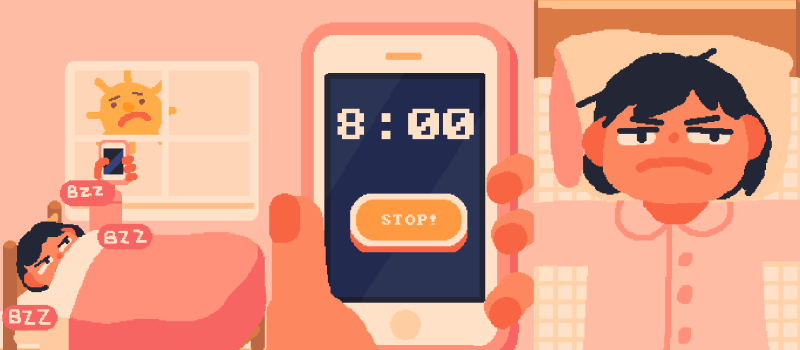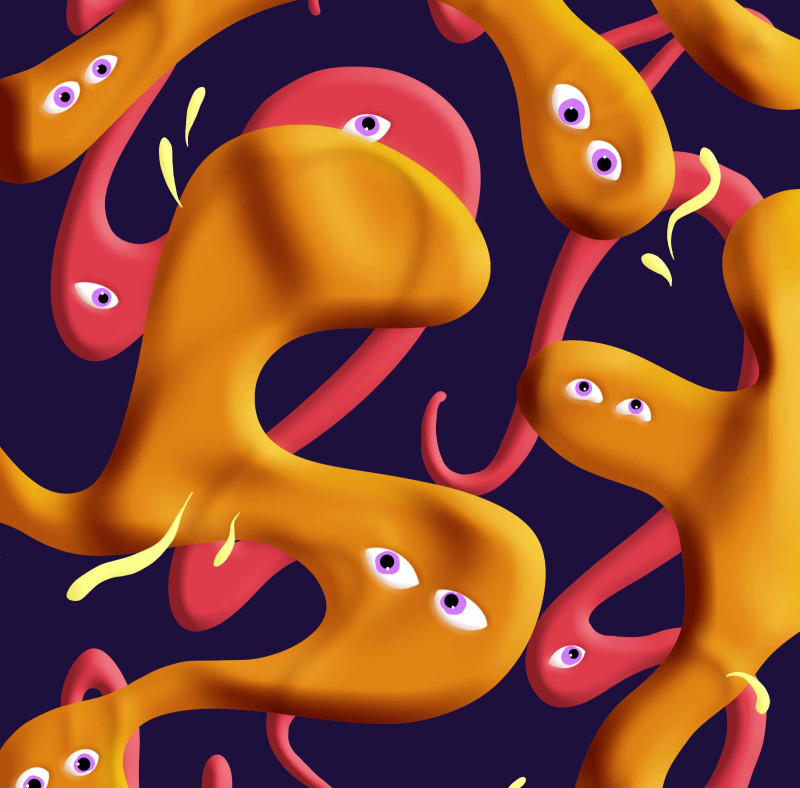Consume me
After her mom tells her to lose some weight, Jenny starts counting calories like crazy. Coupled with a ferocious workout scheme, she quickly derails into an unhealthy relationship with her body. The presentation might look cute and innocent, but the themes Consume Me tackles are anything but.
Consume Me is a video game based around the eating disorders creator Jenny Jiao Hsia has struggled with in the past. Jenny (the player character) doesn’t just have to balance her calorie intake (which is initially done by literally balancing food on her plate), but has to schedule her whole life around her diet. If she doesn’t eat enough, she won’t have enough energy to study. But if she eats too much she won’t fit into that new bathing suit so she can impress her crush. It soon becomes apparent that there’s no quick silver bullet solution, which adequately portrays the long term problematic relation a lot of people have with food.
About the developer
Consume Me is being developed by NYU Game Center alumni Jenny Jiao Hsia and AP Thompson. The game started as a series of prototypes created by Hsia for her Master’s thesis, after which Thompson joined to help fit all the pieces together. They hope to release it in 2022.

Interview with Jenny Jiao Hsia and AP Thomson
While playing this, during certain minigames and in balancing all the different things in Jenny’s life, I felt like I had less control than I wanted to. Was that a deliberate design goal?
J: Well, that also might have been because you played a version without a proper tutorial.
AP: Given that there doesn’t exist a version with a proper tutorial. (laughs)
But to answer your question more directly: Consume Me started as a game about Jenny’s experiences with dieting, but along the way it transformed into a game about a lot of stuff Jenny was thinking about as an adolescent and dieting was just a part of that. For sure, we ask players to balance all these different elements. As far as not having as much control as you like, that may be down to the version of the game you’ve played.
Consume Me is presented in a comical fashion - the yoga minigame is very silly for instance - but the message it transfers is quite harsh. Did you want players to feel what you felt at the time?
J: I think it’s a mix of elements that are exaggerated and things that feel pretty similar to how I experienced them. When I was dieting in high school it felt like there was even less control than you have in the game. For instance in the game you can be, to a certain point, selective of what you eat, but in real life I was a lot more entitled to eat whatever I wanted.
One of the scenes that’s really dramatic is when Jenny has to get on the scale. Did that feel as dramatic to you at the time?
J: Yeah, but the way I weighed myself in real life wasn’t so planned out. I used to weigh myself every single day. We still want to let players experience the impact of struggling with diet, but of course it’s not exactly the same. For me, dieting was not eating and I wanted players to feel that challenge too.
Was there a specific reason to use a visual style that feels light and breezy, almost upbeat?
J: At the NYU Game Center we had this prototyping class taught by Bennett Foddy where we had to create a prototype. The art style that’s used in Consume Me was developed from the art style I created for that prototyping class. I guess I just liked the colors.
Apart from drawing on your own experiences to create the game, is there some kind of message or layer of awareness that you want to incorporate in the game’s story?
AP: This is something that the two of us spend a lot of time talking about. When [Jenny] started the project it was more based on these vague notions and you were showing me lots of diary entries and all these diagrams of different plans you were following. We have all this archival material of Jenny’s life - she really kept great records…
J: Yeah, I don’t throw something away. (laughs)
AP: So we have all these great records, but at the same time we don’t want to make a documentary out of it.
J: One of the most difficult things we are facing is how do we end it? It’s based on real life and these things basically keep going on.
AP: It doesn’t have clean endings in the way a manufactured narrative would.
J: I don’t want to spoil too much, but I think the message we want to get across is that sometimes you just have to let go and move on.
AP: But also that there’s not a single magical trick. Even when Jenny starts moving down the path towards living a better life, it’s still difficult and she has stumbles. There’s at least one moment later in the game where Jenny believes she’s discovered something that’s gonna solve all her problems, but over the remaining part of the game it becomes clear that, no, this didn’t really fix everything. It’s not like there’s a happily ever after.
J: Even though that’s what I wanted so bad back then.
Does that imply that’s the way it went in real life, Jenny?
J: Sort of. I really held these beliefs that if I did those things or accomplished that, then I would finally get what I want. A lot of people have this mindset of “when I do this, I will finally get the boy of my dreams.” But that’s not it. That’s totally not it.
Does you mom know she’s featured in the game? And how she’s features in the game?
J: Yeah, she’s played the beginning of the game. And…
AP: Though, you said maybe she skipped all the text.
J: Yeah, she did skip a lot of text. (laughs). No, she saw and she’s positive about it.
At what point did you join, AP? What drew you to the project?
AP: I joined in 2018 at which point Jenny was working on different prototypes on and off for about a year. At that point I had just finished my last game which was Fortune-499 so I didn’t have any major projects going on. The game was going to be showcased in the fall and Jenny needed help to tie all these separate ideas and mechanics together. So we built a demo, started shopping that around to publishers, got some money and then I basically joined fulltime. I was still part time teaching at NYU when COVID hit and we had to start remote teaching. And this was way more fun than remote teaching.
Consume Me is one of the few unreleased games in the exhibition. How far along is development?
AP: I’d day we’re over seventy percent done. The main difference between the game that we have now and the build that will be shown is that back then we didn’t have a complete picture of what the story was going to be. Right now, we have the story written down from start to end with the different parts in varying stages of completion. I think it’s become quite a cliche to say the game’s coming out when it’s done, but I think we have enough runway right now to say that you can expect it when it’s done.
Did you always want Consume Me to be a commercial game? It can’t be easy to put out a game that draws on personal experiences for the whole world to buy?
AP: I always assumed the shape of the game Jenny was headed was closer to an art game, a sort of simple, personal, interactive experience, but I think she was interested in making it something larger and perhaps more what’s considered a traditional game. I mean, I resisted the idea of there being game overs in the game for a long time. Like, what are game overs doing in an art game? But you definitely wanted them and when we finally put them in, the game got a lot more interesting.
Interview by Christophe De Bont
For more info, follow @DifferentPerspectives_Festival on Instagram
